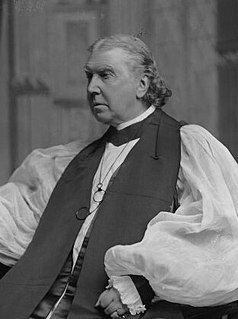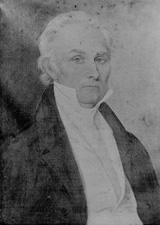Charles Tait may refer to:
Charles Tait may refer to:

The Story of the Kelly Gang is a 1906 Australian bushranger film that traces the exploits of 19th-century bushranger and outlaw Ned Kelly and his gang. It was directed by Charles Tait and shot in and around the city of Melbourne. The original cut of this silent film ran for more than an hour with a reel length of about 1,200 metres (4,000 ft), making it the longest narrative film yet seen in the world. It premiered at Melbourne's Athenaeum Hall on 26 December 1906 and was first shown in the United Kingdom in January 1908. A commercial and critical success, it is regarded as the origin point of the bushranging drama, a genre that dominated the early years of Australian film production. Since its release, many other films have been made about the Kelly legend.

Archibald Campbell Tait was an Archbishop of Canterbury in the Church of England and theologian. He was the first Scottish Archbishop of Canterbury.
Robert Blyth Tait is a New Zealand equestrian. Tait has competed at four Olympics and has won four medals, one of only four New Zealanders to do so.

Shaun Tait is a former Australian professional cricketer who was appointed as the bowling coach of the Pakistan national cricket team in February 2022. He played as a right arm fast bowler and represented Australia in all three forms of cricket, but had most success in One Day Internationals, in which he was a member of Australia's undefeated team at the 2007 Cricket World Cup, and Twenty20 cricket. Tait won four different awards throughout his career including the Bradman Young Cricketer of the Year in 2004. He was one of the fastest bowlers in the world during his time.
Tait may refer to:
John Tait may refer to:
The Enumclaw horse sex case was a series of incidents in 2005 involving Kenneth Pinyan, an engineer who worked for Boeing and resided in Gig Harbor, Washington; James Michael Tait, a truck driver; and other unidentified men. Pinyan and Tait filmed and distributed zoophilic pornography of Pinyan receiving anal sex from a stallion under the alias "Mr. Hands". After engaging in this activity on multiple occasions over an unknown span of time, Pinyan received fatal internal injuries in one such incident.
Tait is a Scottish surname which means "pleasure" or "delight." The origins of the name can be traced back as far as 1100. Notable people with the surname include:
Tommy Tait may refer to:
William Tait is the name of:

Charles Tait was a United States senator from Georgia and a United States district judge of the United States District Court for the District of Alabama, the United States District Court for the Northern District of Alabama and the United States District Court for the Southern District of Alabama.
Robbery Under Arms is an 1882-1883 novel by Rolf Boldrewood, writing as Thomas Alexander Browne.
Peter Tait may refer to:
Richard Tate or Tait may refer to:
Douglas Tait, Taitt or Tate may refer to:
Robert Tait may refer to:
James Tait may refer to:
The film-poem is a label first applied to American avant-garde films released after World War II. During this time, the relationship between film and poetry was debated. James Peterson in Dreams of Chaos, Visions of Order said, "In practice, the film poem label was primarily an emblem of the avant-garde's difference from the commercial narrative film." Peterson reported that in the 1950s, overviews of avant-garde films "generally identified two genres: the film poem and the graphic cinema". By the 1990s, the avant-garde cinema encompassed the term "film-poem" in addition to different strains of filmmaking. Film-poems are considered "personal films" and are seen "as autonomous, standing apart from traditions and genres". They are "an open, unpredictable experience" due to eschewing extrinsic expectations based on commercial films. Peterson said, "The viewer's cycles of anticipation and satisfaction derive primarily from the film's intrinsic structure." The film-poems are personal as well as private: "Many film poems document intimate moments of the filmmaker's life."
Curtis Guy Yarvin, also known by the pen name Mencius Moldbug, is an American blogger, software engineer, and internet entrepreneur. He is known, along with fellow theorist Nick Land, for founding the anti-egalitarian and anti-democratic philosophical movement known as the Dark Enlightenment or neoreactionary movement (NRx).
Alexander Tait, Sawney Tait or Saunders Tait was a tailor, a published poet and also a contemporary of Robert Burns who he knew well. Tait was also well acquainted with the published poet and close friend of Burns, David Sillar. Sawney spent much of his life in Tarbolton where he was an active member of the community. His poems were exhibited in the 1896 Burn Exhibition, a copy being loaned by the Mitchell Library. Alexander was generally known locally as 'Whip-the-cat' an old expression that referred to itinerant tailors, etc. who went from door to door to do work for others.